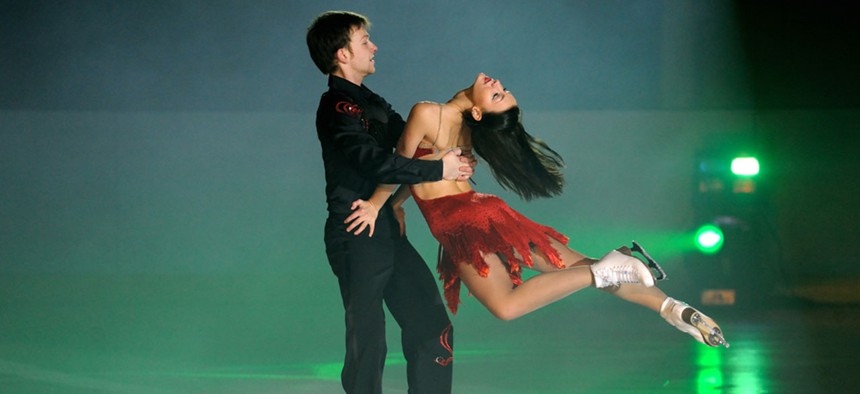
Diego Barbieri / Shutterstock.com
Watching Experts Gives People Confidence In Themselves That They Absolutely Do Not Deserve
We overestimate our ability to do the feats we see demonstrated by others.
I have a confession. Every four years I sit on my couch and watch several hours of Olympic figure skating. I watch professional athletes with decades of training under their spandex leap and twirl around the rink and I think: I bet I could do that.
For reasons that defy logic, there is a part of me—a person with absolutely no relevant experience, apart from maybe four public skate sessions and an ill-advised stint with rollerblades in the late 1990s—that truly believes that with an hour or two to myself at the local mall ice rink, I could pull off a Lutz.
I could not. But new research in the journal Psychological Science suggests I’m not the only person who suffers from occasional bouts of delusional self-confidence.
A pair of researchers from the University of Chicago Booth School of Business conducted six separate experiments in which people who watched an expert demonstration of a particular skill experienced a big surge in confidence in their own skill-doing ability, and zero increase in their actual ability.
People who watched a video 20 times in a row of an expert dart player throwing a bullseye were far more likely to believe they too could throw a bullseye than people who watched the video only once, and not at all more likely to actually throw a bullseye. People who watched someone win a computer game likewise were unduly confident that they too would win the computer game.
In one of the more painfully familiar examples, people who watched multiple loops of a dancer doing Michael Jackson’s signature “moonwalk” believed they too could do the moonwalk. Then they actually tried the dance move themselves, which the researchers recorded (ouch) and then showed to neutral judges, who confirmed the subjects could not, in fact, do the moonwalk.
The internet teems with video tutorials of would-be teachers demonstrating all kinds of skills, from guitar licks and backflips to self-defense moves and magic tricks. But students who believe they can master any of those talents simply by watching are as delusional as I am during the Olympics ladies’ free skate.
We may place too much faith in how much we’re able to learn by observation alone, the researchers say. “People often miss subtleties while watching, and so people are prone to underestimate the complexity of the skill, and overestimate their own abilities,” doctoral student Michael Kardas and behavioral science professor Ed O’Brien wrote in Harvard Business Review (paywall).
Demonstrations are effective teaching tools, they wrote, but only when paired with actual practice. Learners also found training videos more effective if they watched them after attempting the skill first, rather than the other way around. “Don’t plan to watch now and practice later; that is what caused people in our experiments to develop the (illusory) feeling of ‘I bet I could do that!’” they wrote. (Duly noted for Beijing 2022.)
Either way, no amount of viewing replaces the value of performed repetitions. That’s where students notice subtleties of execution that are far harder to pick up when watching an experienced master at their craft. You may not need all 10,000 hours of practice that Malcolm Gladwell says you need to master a skill, but you have to have some.






